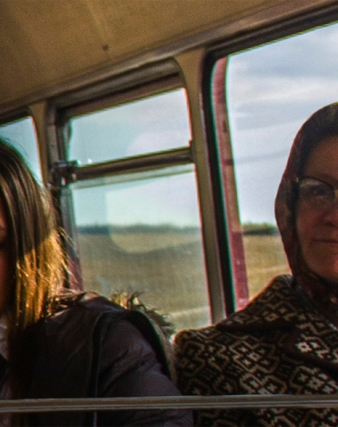
Amidst all the national hand-wringing over the fate of those forlorn, native North Africans and Middle-Easterners fleeing the unspeakable horrors perpetrated by bloody tyrants and religious fanatics, it is far too easy to overlook the individual tragedies and lifelong psychological scarring accompanying such events, that in truth, only a comfortable armchair can ignore. How timely then that a play so relevant yet tangentially set should make its way onto our stage. An odd kind of reversal in which the immigrant plays host to a native and offers uncommon succour forms the plot in Jon Welch’s touring production, set in the East Anglia of 1973.
The immigrant in this case is a middle-aged woman who came to the UK under the Kindertransport initiative in which Jewish children were given passage from a hostile Germany and placed with sympathetic families in the UK. In Transports a ‘hostile’ teenage girl is placed in the foster-care of Lotte, a native German, whose parents were killed by the Nazis in one of their extermination camps. The play is based on the experience and poems of the designer, Alan Munden’s, own mother, Liesl Munden, who was herself, at the age of fifteen, brought to England in the latter stages of the Kindertransport.
Writer, Jon Welch, skilfully avoids the grim, well rehearsed details of that dark passage of history and concentrates instead on the psychological and emotional effects of displacement and parental loss on two quite disparate women. Lotte is thus in a unique position to sympathize with the stroppy, Dinah who was separated at birth from her own mother, a sixteen year old Irish girl who later committed suicide and who has so far trashed the best efforts of a parade of foster carers.
Striking back at she’s-not-quite-sure-what, for reasons she probably could not articulate, Dinah is a rebel with a deep scar. Branded a ‘slut’ by her peer group on account of her aggressive and self-destructive promiscuity, she resists the patient and troubled tolerance of Lotte as she tries to penetrate the carapace which exhibits as a kind of emotional void, but in fact hides, we suppose, a deep sense of loss and unresolved feelings of rejection.
Welch (who also directs) as in the best theatre, shows rather than explains and so we learn about the two women through the emotional arm wrestling between two equally determined and damaged women. As Lotte says, ‘The camps never go away’. The acting is faultless in this demanding two-hander with Juliet Welch playing Lotte and her mother with Hannah Stephens taking the young Lotte and Dinah. Both actresses giving well delineated and emotionally fluent performances in each of their characters.
Alan and Jude Munden’s set comprises two sets of rails which provide a looming reminder of the death camps and the journeys each of the women has been on. ★★★★☆ Graham Wyles 1st February 2016

